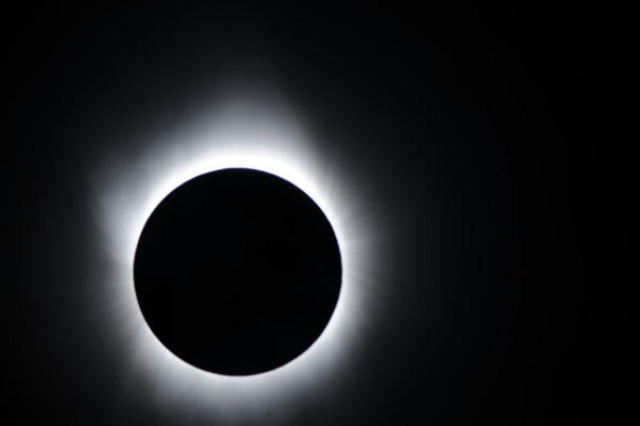Everything You Need To Know To View The Great American Solar Eclipse In Illinois
By Stephen Gossett in News on Jul 21, 2017 4:57PM

Kids get stoked for a partial eclipse in 2015. Getty Images / Photo: Pablo Blazquez Dominguez
For the first time in almost 100 years, a hyper-rare total solar eclipse will extend across the United States, on Aug. 21. Chicagoans won't have the very best seats for the spectacle (although we're really just a road trip away) but we'll still be treated to a high-percentage partial eclipse. At Chicago's peak time (approximately 1:19 p.m.), we'll see between 86 and 87 percent of the sun blocked out by the moon, according to Annie Vedder, Curator of Experience at Adler Planetarium—which is acting as something of a ringleader for all things Great American Eclipse in Chicago this summer.
The eclipse starts at 11:54 a.m. (perfect lunchtime timing) and gradually shifts through its stages until about 2:42 p.m. "It's a long show," Vedder said. "I think of it like a jam. The song goes on for a long time." At 11:54 a.m., "the moon can be seen slowly coming across the sun, and as the afternoon goes on, you''ll see more and more" of the sun blocked out—if not quite all the way.
"I still think 86 percent is a pretty awesome thing to see," Vedder adds.
As with all eclipses, staring up into the sun is a profoundly bad idea, so you absolutely don't want to eyeball the celestial show without solar-eclipse glasses. Luckily, there will be a lot available, including some 10,000 available for free at local libraries around the city heading up to the GAE, Vedder said. Adler will also be handing them out a week ahead of the eclipse, at the planetarium.
If you can't secure a pair, there are some (pretty amazing) recommendations for what one can fashion into impromptu projectors here, including colanders, a tree leaf with hole, even crackers.
Here in town, the best "watch party," as it were, is probably at the Adler, which will have free block party, complete with solar car races (before the eclipse peaks we presume) and science demos. A satellite party also goes down at Daley Plaza, where you eclipse glasses will also be distributed, while they last, and check out telescope viewing.
Other viewing parties are scheduled at the following spots, again with glasses available while supplies last. Check websites for details.
- Chicago Botanic Garden
- Chicago Park District
- Chicago Public Library
- Morton Arboretum
- Naper Settlement
- Sea Dog Cruises
- Wonder Works Children’s Museum
But if you want to get literally the total effect, a five-hour trip downstate to Carbondale lands you not only in the path of totality—"where the moon will completely cover the sun and the sun's tenuous atmosphere - the corona - can be seen," according to NASA; but also a glimpse of the longest "totality" duration of anywhere in the country (2 minutes 41 seconds). But expect a huge crowd if you do go that option, and start making lodging plans yesterday.
Check out Adler's handy FAQs for more information.

A total solar eclipse viewed in Asia, in 2009 (Photo by National Astronomical Observatory of Japan via Getty Images)